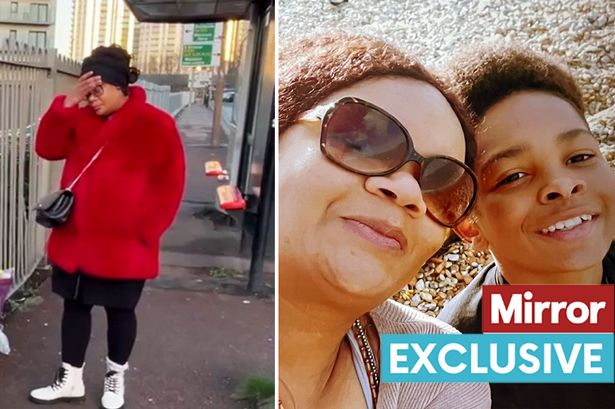The tragic death of 14-year-old Kelyan Bokassa, stabbed on a London bus in Woolwich, has left a gaping wound in the heart of his family and community. His mother, Mary, overwhelmed by grief, visited the site of the incident where a makeshift memorial of flowers, cards, and heartfelt messages testified to the young life lost. The poignancy of a mother’s sorrow amidst the public outpouring of grief underscores the devastating impact of knife crime, a pervasive issue plaguing London and other urban centers. Kelyan’s death has become a stark symbol of the senseless violence that robs families of their loved ones and communities of their future.
Kelyan’s story, though tragically short, resonates with the countless other victims of youth violence. He was a young boy on the cusp of adulthood, navigating the complexities of adolescence with dreams and aspirations yet to be realized. The casual nature of his death, occurring on a public bus during an ordinary afternoon, heightens the sense of vulnerability and the urgent need for solutions. It forces a confrontation with the reality that knife crime can strike anywhere, anytime, shattering the illusion of safety in everyday life. The bus stop, now a place of mourning, serves as a chilling reminder of the precariousness of young lives in a society grappling with the scourge of violence.
The outpouring of grief and support from the community reflects not only the collective sorrow for Kelyan’s loss but also a growing sense of frustration and anger at the seemingly intractable problem of knife crime. The tributes left at the bus stop, each a testament to Kelyan’s impact on those who knew him, paint a picture of a vibrant young life tragically cut short. They speak of a beloved son, brother, friend, and classmate, whose absence will be deeply felt by many. This collective mourning underscores the interconnectedness of community and the shared responsibility to address the root causes of violence.
Beyond the immediate grief and shock, Kelyan’s death prompts a broader conversation about the societal factors that contribute to youth violence. Poverty, lack of opportunity, social inequality, and the normalization of violence within certain subcultures are all contributing factors. The easy accessibility of knives, coupled with a culture of fear and intimidation, creates a dangerous environment where young people often feel pressured to carry weapons for protection. Addressing this complex issue requires a multi-pronged approach, encompassing law enforcement, education, community outreach, and social programs aimed at providing young people with alternative pathways to violence.
The investigation into Kelyan’s death is ongoing, with authorities working to bring those responsible to justice. However, justice alone cannot heal the wounds inflicted by such a senseless act. The focus must shift towards prevention and intervention, working to create a society where young people feel safe, valued, and empowered to make positive choices. This involves investing in youth services, providing access to mental health support, and fostering a sense of community and belonging. It also requires challenging the narratives that glorify violence and promoting positive role models who can inspire young people to choose a different path.
Kelyan Bokassa’s death serves as a tragic reminder of the urgent need to address the root causes of youth violence. It is a call to action for individuals, communities, and governments to work together to create a safer future for all young people. While the tributes left at the bus stop offer a poignant testament to a life lost too soon, they also represent a collective commitment to ensuring that Kelyan’s legacy is not defined solely by tragedy, but also by the positive change it inspires in the fight against knife crime. His memory should serve as a catalyst for a sustained and concerted effort to break the cycle of violence and build a society where young people can thrive, free from the fear of becoming another statistic. The tears shed by his mother, and the collective mourning of the community, must be transformed into a powerful force for change, demanding a future where no other parent has to endure the unimaginable pain of losing a child to senseless violence. This requires a fundamental shift in societal attitudes, a commitment to investing in our youth, and a recognition that the fight against knife crime is a fight for the very soul of our communities.














